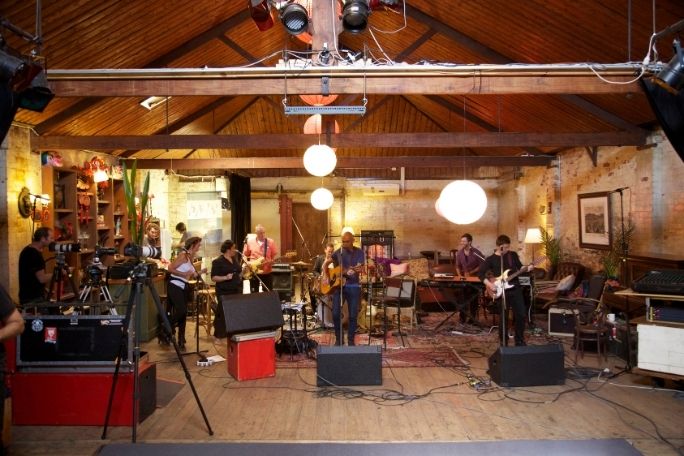Lesson summary
Students explore biographies as a text type through exploration of the documentary Paul Kelly – Stories of Me. Focusing on childhood, family, place and memory, students complete a number of visible thinking routines to develop their understanding of biographical elements. They then apply their understanding of the nature of representation in biographical texts by interviewing a person about their experiences growing up, and represent the information in their own biographical text.
This lesson uses sections of Shark Island Production’s Paul Kelly – Stories of Me as learning stimuli. Teachers are required to create an account on the film’s website to view the film. Upon registration you will be given a code – give this to your students so that they can access the film too.
Key points to explore:
- A biography is the representation of someone’s life.
- It is generally accepted that biographical accounts are based in the truth, however it is interpreted through the biographer.
- There are different elements in a person’s life that make up their biographical story.
Lesson guides and printables
Lesson details
Curriculum mapping
Australian curriculum content descriptions:
Year 9 English:
- Analyse how the construction and interpretation of texts, including media texts, can be influenced by cultural perspectives and other texts (ACELY1739)
- Use interaction skills to present and discuss an idea and to influence and engage an audience by selecting persuasive language, varying voice tone, pitch, and pace, and using elements such as music and sound effects (ACELY1811)
- Explore and reflect on personal understanding of the world and significant human experience gained from interpreting various representations of life matters in texts (ACELT1635)
- Create imaginative, informative and persuasive texts that present a point of view and advance or illustrate arguments, including texts that integrate visual, print and/or audio features (ACELY1746)
Year 10 English:
- Analyse and evaluate how people, cultures, places, events, objects and concepts are represented in texts, including media texts, through language, structural and/or visual choices (ACELY1749)
- Use organisation patterns, voice and language conventions to present a point of view on a subject, speaking clearly, coherently and with effect, using logic,imagery and rhetorical devices to engage audiences (ACELY1813)
- Analyse and explain how text structures, language features and visual features of texts and the context in which texts are experienced may influence audience response (ACELT1641)
- Create sustained texts, including texts that combine specific digital or media content, for imaginative, informative, or persuasive purposes that reflect upon challenging and complex issues (ACELY1756)
Year 11 English:
Unit 1
Investigate the relationships between language, context and meaning by:
- explaining how texts are created in and for different contexts (ACEEN001)
Examine similarities and differences between imaginative, persuasive and interpretive texts including:
- evaluating the impact of description and imagery, including figurative language, and still and moving images in digital and multimodal texts. (ACEEN007)
Analyse and evaluate how responses to texts, including students’ own responses, are influenced by:
- the use of imaginative, persuasive and interpretive techniques. (ACEEN010)
Create a range of texts:
- using appropriate form, content, style and tone for different purposes and audiences in real and imagined contexts (ACEEN011)
- drawing on a range of technologies in, for example, research, communication and representation of ideas (ACEEN012)
- combining visual, spoken and written elements where appropriate (ACEEN013)
- using evidence-based argument (ACEEN014)
Investigate the representation of ideas, attitudes and voices in texts including:
- analysing the ways language features, text structures and stylistic choices shape points of view and influence audiences (ACEEN024)
Analyse and evaluate how and why responses to texts vary through:
- the interplay between imaginative, persuasive and interpretive techniques, for example, how anecdotes are used in speeches to amuse, inform or influence, or the use of characteristation in advertising (ACEEN030)
Create a range of texts:
- using imaginative, interpretive and persuasive elements for different purposes, contexts and audiences (ACEEN032)
- experimenting with text structures, language features and multimodal devices (ACEEN033)
- selecting and applying appropriate textual evidence to support arguments (ACEEN035)
General capabilities: Literacy, Critical and Creative Thinking, Personal and Social Capability, Intercultural Understanding, ICT Capability.
Unit of work: PAUL KELLY – STORIES OF ME
Time required: 120 minutes (or 2x 60 minutes)
Level of teacher scaffolding: Medium – facilitate student discussion, coordinate student movement around classroom.
Resources required
- Student Worksheet – one copy per student (this lesson works best if the worksheet is printed)
- Device capable of presenting a website to the class
- Copy of Paul Kelly – Stories of Me (teachers are required to create an account to view and invite students to view the film)
- Venn Diagram print out
- Question print-outs (linked here, here, here, here and in the Teacher Worksheet), Blu-Tack, sticky notes, recycled scrap paper for students to sketch on
Additional info
This lesson uses sections of Shark Island Production’s Paul Kelly – Stories of Me as learning stimuli. Teachers are required to create an account on the film’s website to view the film. Upon registration you will be given a code – give this to your students so that they can access the film too.


Welcome back!
Don't have an account yet?
Log in with:
By signing up to Cool.org you consent and agree to Cool's privacy policy to
store, manage and process your personal information. To read more, please see
our privacy policy here(Opens in new tab).
Create your free Cool.org account.
Many of our resources are free, with an option to upgrade to Cool+ for premium content.
Already have an account?
Sign up with:
By signing up to Cool.org you consent and agree to Cool's privacy policy to
store, manage and process your personal information. To read more, please see
our privacy policy here(Opens in new tab).